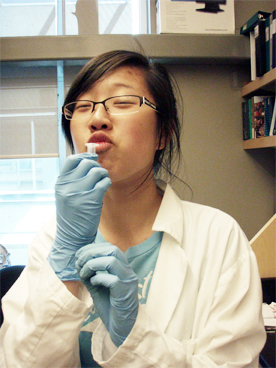Team:British Columbia/Notebook/Week 9
From 2011.igem.org
(Difference between revisions)
Watermelon (Talk | contribs) |
|||
| Line 1: | Line 1: | ||
[[File:Daisykissprare.jpg]] | [[File:Daisykissprare.jpg]] | ||
| + | |||
| + | ==July 31 2011== | ||
| + | |||
| + | '''Track: Alpha-pinene synthase''' | ||
| + | |||
| + | Joe is troubleshooting his PCR reaction in preparation of his yeast and biobrick plasmid construction. This time he used an annealing temperature of 60 degree Celsius, the low range for Phusion Hot Start Polymerase. The results after gel verification show a supercoiled DNA above the 1kb ladder and a small non-specific high molecular weight smear near 6-8kb. This was unexpected as the pinene synathase should be around 2.1kb long. It is unknown why this may be. Next time, he will try increasing the extension time and a higher annealing temperature. | ||
| + | |||
| + | ==August 01 2011== | ||
| + | |||
| + | '''Track: Alpha-pinene synthase''' | ||
| + | |||
| + | Yup... troubleshooting the previous PCR reaction again. Joe used an annealing temperature of 63 degree Celsius or 65 degree Celsius and | ||
Revision as of 20:28, 2 August 2011
July 31 2011
Track: Alpha-pinene synthase
Joe is troubleshooting his PCR reaction in preparation of his yeast and biobrick plasmid construction. This time he used an annealing temperature of 60 degree Celsius, the low range for Phusion Hot Start Polymerase. The results after gel verification show a supercoiled DNA above the 1kb ladder and a small non-specific high molecular weight smear near 6-8kb. This was unexpected as the pinene synathase should be around 2.1kb long. It is unknown why this may be. Next time, he will try increasing the extension time and a higher annealing temperature.
August 01 2011
Track: Alpha-pinene synthase
Yup... troubleshooting the previous PCR reaction again. Joe used an annealing temperature of 63 degree Celsius or 65 degree Celsius and
 "
"
